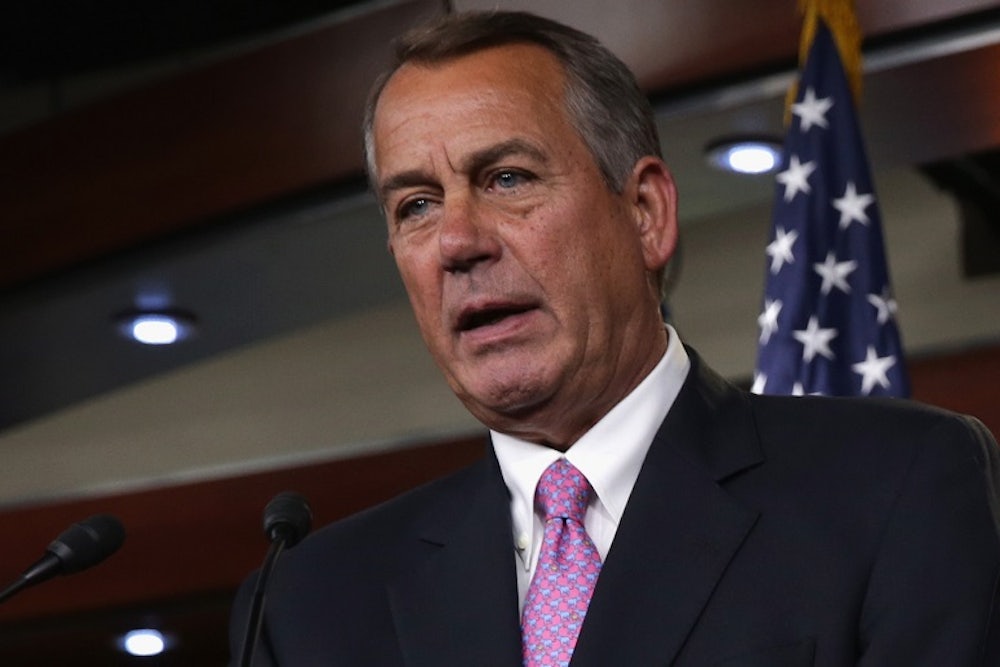Many conservatives think unemployment benefits discourage people from working. That’s one reason they were happy to let an emergency extension of benefits, dating back to 2008, expire in December. Once the program ended, they predicted, more people would start working. They expected a particularly sharp change in the long-term unemployed—people who have been out of work more than six months. On Fox News in December, Senator Rand Paul argued that extended benefits do a "disservice" to the long-term unemployed and cause “them to become part of this perpetual unemployed group in our economy.” Eliminating the benefits would supposedly prevent that.
So far, that prediction has not come true. More than three months later, the rate of decrease in long-term unemployment rate hasn’t changed:

Conservatives aren’t ready to give up their theory, however. One reason: Some liberal predictions haven’t come true, either. In order to collect unemployment benefits, beneficiaries must continue looking for work—or at least say they are doing so. Liberals argued that unemployment benefits were the only thing keeping these workers connected with the labor market; with the benefits gone, this argument went, these people would drop out of the workforce altogether. For instance, Matt Yglesias wrote in December:
One consequence of this is that the unemployment rate will almost certainly go down, since some fairly substantial fraction of the long-term unemployed will just stop looking for a job and drop out of the labor force. If you're long-term unemployed, then almost by definition looking for work has not been very successful at getting you work. What it has gotten you is a UI check. Take away the check, there's no point in bothering, and so the denominator in the unemployment rate falls and thus the unemployment rate falls.
But the unemployment rate is unchanged since December at 6.7 percent. Yglesias’s prediction would have affected the long-term unemployment rate in the same way the conservative prophecy would have: By causing the rate to fall. And, again, that hasn’t happened. The Federalist’s Scott Lincicome and The New York Times’ Ross Douthat have both pointed this out on Twitter:
These are fair points, but what about the trends *liberals* predicted would follow from cutting off UI? http://t.co/kjlc5QpiI9
— Ross Douthat (@DouthatNYT) April 11, 2014Douthat and Lincicome are right that liberal predictions of a sharp drop in the long-term unemployment rate haven’t come true. But it’s not clear that prediction ever made that much sense in the first place. “It’s going to reduce labor force participation by less than 0.1 [percentage points],” Jesse Rothstein, a labor economist at the University of Berkeley told me, based on his estimates. “It wouldn’t be something you would see from overall participation rates.”
More important, it’s not like that prediction was the central argument liberals made in the fight over unemployment benefits. First and foremost in their minds was the raw hardship that a lapse in benefits would cause. That’s a hard effect to quantify, at least right now, but the anecdotal evidence suggests that many people who lost benefits are struggling. PBS Newshour has been collecting stories about what has happened to the long-term unemployed after their federal benefits expired. It’s not pretty. Anthony, a 46-year-old from Aurora, Colorado, moved in with his sister-and-law and sold all of his belongings so he can eat. Ebony, from Atlanta, lost her benefits and then was offered a temp job 20 miles from her home, but couldn’t afford the $5 daily bus fare to accept it. Alejandro, a 30-year old from San Jose, sold his belongings to feed his autistic son and baby daughter. He told PBS, “Depression has kicked in.” Many others are emptying their retirement accounts to afford basic expenses. These are just anecdotal stories, of course, but their suffering is real.
A clear, more definitive answer to the effects of expiring benefits will take a while to emerge. It will require more time and more data—and, even then, scholars may need time to parse it. Maybe the number of long-term unemployed will drop significantly, giving conservatives and liberals occasion to argue about why. But the 3.7 million long-term unemployed can’t wait months and years for the experts to sort out reality. Right now, they are depleting their savings and selling their belongings to afford food. Sometimes policymakers need to take their cues from the available evidence. That evidence certainly doesn’t undermine the liberal position. If anything, it strengthens it.
